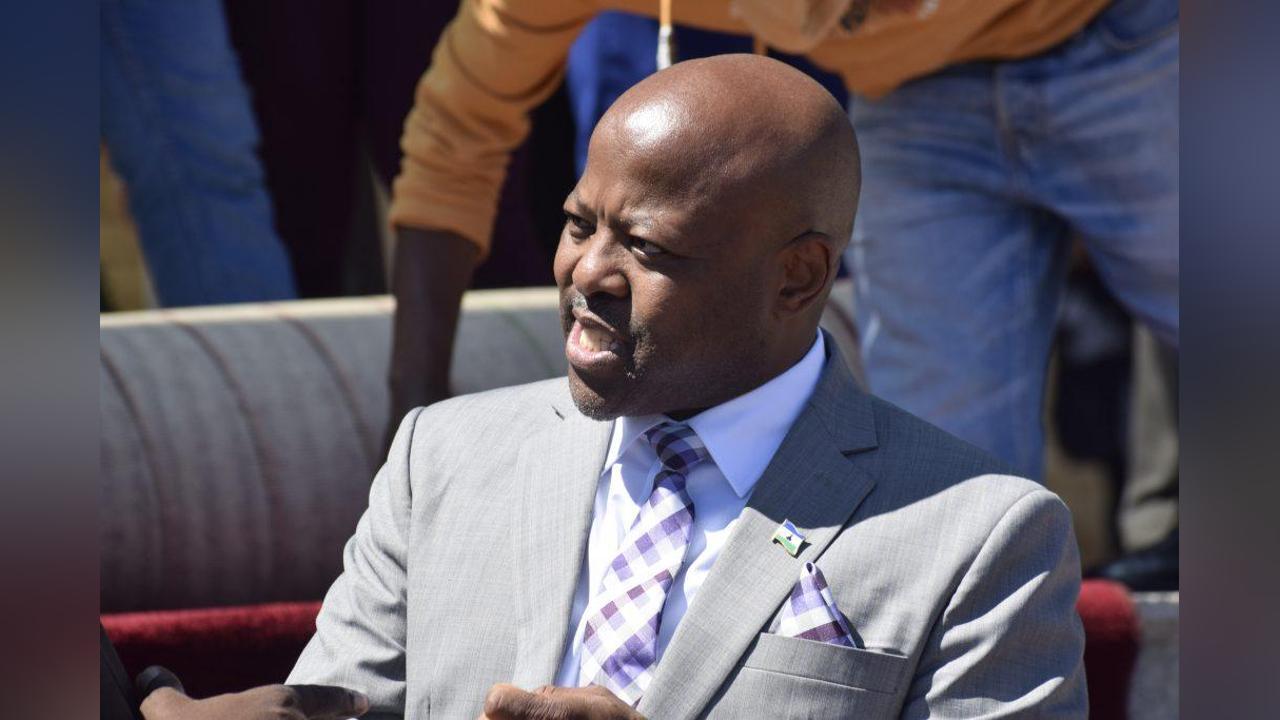Africa-Press – Lesotho. MINING Minister Mohlomi Moleko on Monday came under vicious attack during a debate on the mining sector for allegedly defending mining companies in Lesotho.
The debate was aimed at clarifying the economic impact and compliance of mining companies in the country. In his keynote address, Moleko said the mining industry is one of the largest contributors to our economy.
Moleko said contributions do not only include dividends and royalties but also social responsibilities to the communities. However, he said there are rumours that the mines are robbing Basotho.
“I personally consider this embarrassing,’’ he said. Moleko said it is embarrassing for Basotho to be against such industries that are making a significant contribution to our economy.
With the government holding a 30 percent stake in the mines, Moleko said it is benefiting by getting over 60 percent of profits in such mines. “We are earning more with zero contribution from the government,’’ he said.
Moleko said Letšeng Diamond, as one example, contributed M800 million to the government in its profit last year. He said the mine was left with only M420 million.
The minister said that was “being unfair to the mines”. His remarks appeared to have incensed most delegates at the conference. First to throw the stone was the Basotho National Party (BNP) leader, Machesetsa Mofomobe, who expressed his “disappointment by the tone of the minister”.
Mofomobe accused the minister of speaking as if he was defending “the miners who are scamming Basotho”. “I would have expected a better tone,” Mofomobe said.
Mofomobe refuted Moleko’s statement that Basotho are contributing nothing towards diamond mining. “Our contribution comes from our resources,” he said.
“As I am listening, I can hear the voice of the big mining companies coming out of the government official,” he said.
Mofomobe told the minister that providing services and goods to the mining companies does not require that they get tenders from the government “hence, it is none of the government’s business what is happening on the ground”.
“This is none of your business,” he said.
“We will request your silence on it.
Mofomobe was referring to the tender fight in which a local civil aviation company, Mohahlaula Airlines, is fighting the government for opening competition from foreign companies.
Mohahlaula says giving foreign airline companies tenders to transport diamonds from Lesotho violates the law, arguing that the law provides for such opportunities to be given to a Lesotho company.
Mohahlaula is the only airline company registered in Lesotho and owned by indigenous Basotho. The Civil Aviation Director, Motsoaole Lesupi, was suspended last week for defying the government’s direction to give foreign companies permits to transport diamonds in stark violation of the law.
Mofomobe told the minister that he saw it coming, that Lesupi would be suspended despite that he was legally correct and the ministry wrong. He said the decision to suspend Lesupi was influenced by the mines.
“Are you falling into those traps?” he asked the minister. He said Moleko “is supporting an unfair decision”. “How do you expect us to perceive you?”
Advocate Lucy Sekoboto, who was part of the team that drafted the Mining Act, said there has to be transparency in the procedure to award such jobs to companies.
“Basotho should be given first preference in service delivery to the mines,” Advocate Sekoboto said.
She said the mines should follow the right processes so that the service providers can know when they have failed to meet safety and economic efficiency standards.
“How would one know when one failed the standards if the processes were not transparent?” she said. She said even the team responsible for monitoring the performance of the mines has become part of the mines.
Lebakeng Tikheli from the Lesotho Business Chamber said the government has to “differentiate between Basotho-owned companies and locally registered companies”.
He said the law, which talks of Basotho being the first preference in providing services, does not favour indigenous Basotho. “Please change your definition of beneficiation from locally owned to indigenous businesses,’’ he said.
He said it clearly defines how Basotho should benefit from local diamonds. “I am shocked by your side of the story,’’ he said. The Social Revolutionaries (SR) leader, Teboho Mojapela, said the mines have not improved the livelihoods of local communities.
He said the communities in the mines are the most vulnerable groups. Mojapela said the beneficiation of the mines only covers a small fraction of Basotho, not every Mosotho.
“I discovered that only foreigners and a few law violators benefit,’’ Mojapela said.
The Executive Director of the Transformation Resource Centre (TRC), Tsikoane Peshoane, urged the minister to set aside matters that involve service providers and mines.
Peshoane said the minister should focus on empowering Basotho to get back to business. “Unless we are committed to bringing about structural changes and a legal framework, the policy will not make any difference,’’ Peshoane said.
In defending the mines, Moleko said the Income Tax Bill Amendment 2021, which seeks to end a zero-rated era, “is erroneous and unfair to the mines”. “The mines are not only making a significant contribution, but they also comply with laws and regulations,” he said.
He said in 2022 Letšeng allocated 89 percent of its subcontracts to Basotho. He said this initiative shows compliance with giving Basotho first preference on providing services to the mine.
He said 11 percent was allocated to foreign companies based on skills the country does not have. “The target is that 100 percent of that work should be operated by local companies,” he said.
However, he said the law stipulates that Basotho should be given first preference on the basis that they meet safety, technical skills, and economic efficiency.
Moleko said he even forced the mining company to at least give a preferred profit margin of five percent over and above the Act. He said this initiative was to help local companies.
“There is no way we can let a local company double their prices just because it is a local company,” he said, referring to Mohahlaula.
For More News And Analysis About Lesotho Follow Africa-Press






